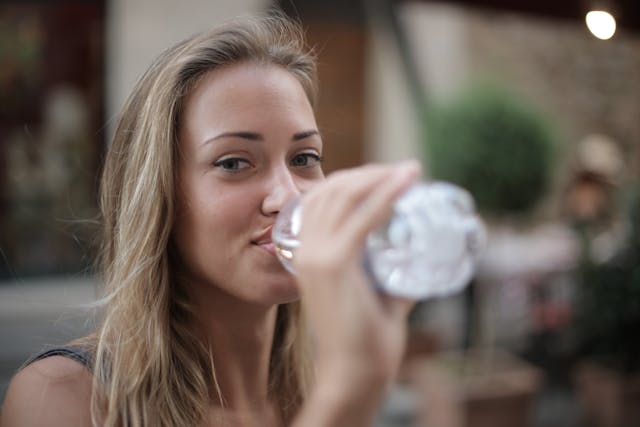Maintaining good health fundamentally hinges on proper hydration—a frequently neglected aspect due to our hectic schedules. Water is essential for virtually every bodily function like regulating temperature, aiding digestion, lubricating joints, and transporting nutrients. Without it, our bodies falter in efficiency and succumb to a cascade of detrimental impacts on both physical and mental well-being.

Staying hydrated requires more than just drinking water when thirst strikes; many individuals succumb to widespread hydration blunders, resulting in either insufficient or excessive hydration, each carrying distinct risks.
This article explores the most common hydration mistakes and offers practical advice to sidestep them.
Drinking Too Little Water
Maintaining optimal health hinges on proper hydration; however, the risk of drinking too little water often goes unappreciated. Dehydration exerts a profound impact; fatigue emerges as one of its initial symptoms, signaling the body’s battle to sustain energy levels in the absence of sufficient fluids. Chronic dehydration over time leads to serious health complications like kidney stones, urinary tract infections, and cardiovascular decline and can aggravate conditions such as migraines or joint pain. This underscores the significance of regular and ample water intake.
To circumvent dehydration, it is crucial to cultivate habits that guarantee sufficient daily water consumption. Notably, have a reusable bottle for easy access to regular sips of water. Moreover, set phone reminders or employ hydration-tracking apps, particularly useful if your hectic day often leads you to neglect to drink water. These small yet impactful adjustments significantly enhance hydration without necessitating drastic lifestyle changes.
Forgetting Electrolytes
Electrolytes—such as sodium, potassium, magnesium, and calcium—are vital minerals that maintain the body’s fluid balance. They regulate muscle contractions, nerve signaling, and stable blood pressure during hydration. An imbalance in electrolytes can cause cells to swell or shrink due to improper fluid distribution resulting in muscle cramps, fatigue dizziness, or more severe complications like hyponatremia.
Engaging in intense physical activity or excessive sweating prompts the body to lose significant amounts of water and electrolytes. Simply consuming plain water can further dilute depleted electrolyte concentrations, exacerbating imbalances. Consequently, athletes and those partaking in strenuous activities frequently opt to mix the best electrolyte powder in water to guarantee that their efforts at hydration are effective and comprehensive. Electrolytes are essential for proper hydration, particularly in individuals with active lifestyles or those residing in hot climates.
Overhydration
Maintaining health necessitates drinking water; however, overconsumption can precipitate a condition called water intoxication or hyponatremia. This happens as an excess of water disrupts your body’s electrolyte balance by diluting sodium in the bloodstream—a mineral vital for regulating fluid equilibrium, nerve function, and muscle contractions. Dropping levels can induce symptoms like nausea, headaches, confusion, and, in severe cases, seizures or coma.
Athletes and individuals engaging in prolonged physical activity, who often compensate for fluid loss without adequately replenishing electrolytes, face a particularly high risk of overhydration. Similarly affected are those who consume excessive water quickly to detoxify or enhance their health. It is somewhat surprising, but by putting extra pressure on the kidneys to remove surplus fluids, overhydration can eventually result in damage to the kidneys.
To prevent overhydration, a good method is to continue drinking small amounts of water during the day and not consume a large amount at once. Listen to signals from your bodily needs for thirst and consider what you need depending on physical activity or weather conditions.
Consuming Sugary or Caffeinated Beverages
Sugary and caffeinated beverages may impede your hydration. Sodas and energy drinks, heavy with sugar content require the body to expend more effort processing them. This diuretic effect not only strips water from your system but also leaves you feeling increasingly dehydrated when consumed excessively. Sugary drinks frequently lead to weight gain and other health issues such as insulin resistance and a heightened risk of chronic diseases which together exacerbate the erosion of overall well-being.
To sidestep the hazards of sugary and caffeinated drinks, opt for hydrating alternatives devoid of these negative effects. Water, in its pure form, stands unrivaled owing to its essential fluid provision minus superfluous additives. Should plain water seem uninspiring, infusing it with slices of fresh fruit could enhance its palatability.
Not Adjusting Hydration for Activity Levels
Maintaining proper hydration is a fluid process that adapts to your activity levels and the surrounding environment. While exercising, you shed water through sweat—crucial for temperature control—but this amplifies your need for fluids. Similarly, when exposed to high temperatures, you sweat more. This rapid perspiration depletes your body’s fluid reserves, leading to dehydration.
To compensate for water loss during exercise or heat exposure, adopt a proactive hydration approach. Begin by pre-hydrating; consume 17–20 ounces of water several hours prior to engaging in strenuous activities. This initial step provides your body with a head start on maintaining fluid balance. Aim to drink small amounts of water at regular intervals during the activity. This method maintains a consistent level of hydration and prevents overloading your stomach or causing discomfort, rather than waiting until thirst sets in.
Bottom Line
Proper hydration bolsters good health; surprisingly, many easily falter in maintaining it. Understanding and avoiding the common mistakes discussed here enables you to take meaningful steps toward optimizing your hydration habits. Reflect on your current hydration practices and, with small yet consistent tweaks, transform them into a daily beneficial habit.
















Add Your Comment